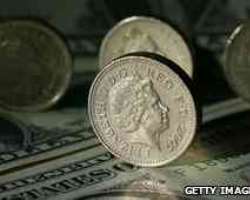ELECTION 2010: POUND FALLS ON UNCLEAR RESULT

Continue reading the main story
Check pound-US dollar rate
Check pound-euro rate
Check FTSE 100
The pound has fallen against both the euro and the dollar after it became clear that a majority government was unlikely to emerge from the election.
Sterling was down nearly three cents, or 2%, against the dollar at $1.4683. Against the euro, it was down almost 1.5 cents at 1.1597 cents.
The markets are concerned that a weak government might be unable to reduce the UK's high budget deficit quickly.
Shares also fell in early trading, with the FTSE 100 down 1.6% at 5,177.59.
The cost of government borrowing also increased.
Other European markets also fell as fears about the Greek debt crisis continued, with France's Cac 40 index down more than 2.6% and Germany's Dax index down 1.7%.
AT THE SCENE
Continue reading the main story
Rebecca Marston, BBC business reporter
“As uncertain as it can be” – the words from the tannoy as the morning pep talk to traders begins here at the Royal Bank of Canada in London.
Static and crackle, squawk boxes and coarse tones are the soundtrack to dealings in currencies and government bonds.
But which way to trade? For weeks the traders here have been betting on a Conservative victory. But the movements on the screens – tentative and nervous – mirror the voters' lack of direction.
Traders in currencies and bonds were at their desks for 1am in a special trading session they hoped would let them steal a march on the election result.
This morning, they were greeted by an uncertain sky, tending to the grey – as apt a description for the short-term outlook for the UK financial climate as it is for the weather.
Leading Asian indexes also slipped overnight, with Japan's Nikkei closing down 3.1%.
High debts
“This messy [political] state of affairs is proving unsettling for the markets, with sterling sinking to a one-year low against the dollar and even losing ground against the euro, which has been torpedoed by the eurozone debt crisis,” said Howard Archer at IHS Global Insight.
Investors are worried that a hung parliament will result in a weak government that will be unable to force through measures to reduce the UK's high borrowing levels.
“Strong leadership and consensus are required to deal with the serious threats still facing the economy,” said Adam Marshall, director of policy at the British Chambers of Commerce.
They are also concerned that the parties will spend too long negotiating with each other over the formation of a new government.
Miles Templeman, director-general of the Institute of Directors, said: “It's vital that this political vacuum is filled as quickly as possible. The country simply can't afford an extended period of political horse trading which delays much needed action to tackle the deficit.
“Politicians have postponed the difficult decisions on public spending cuts for too long already. Further delay will only jeopardise the future of the UK economy.”
Rescue package
The problem of high government debt has been brought into sharp focus by events in Greece, which has been forced to turn to its eurozone partners and the International Monetary Fund for rescue loans.
Although the UK has a much lower level of overall debt than Greece, its budget deficit is almost as high.
European leaders will meet later in Brussels to agree the final details of of a 110bn-euro ($139bn; £86bn) loan package to Greece, while the G7 finance ministers are also due to discuss the Greek debt crisis.
There are concerns that other European countries, particularly Spain and Portugal, may become engulfed in the crisis as investors shun government bonds.
On Friday, the cost of Greek and Portuguese government debt continued to rise, providing further evidence that investors remain unconvinced by the proposed rescue package for Greece.
